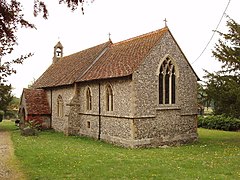Crowell, Oxfordshire
| Crowell | |
|---|---|
 Parish church of the Nativity of the Blesséd Virgin Mary |
|
| Crowell shown within Oxfordshire | |
| Population | 100 (2001 Census) |
| OS grid reference | SU744997 |
| Civil parish |
|
| District | |
| Shire county | |
| Region | |
| Country | England |
| Sovereign state | United Kingdom |
| Post town | Chinnor |
| Postcode district | OX39 |
| Dialling code | 01844 |
| Police | Thames Valley |
| Fire | Oxfordshire |
| Ambulance | South Central |
| EU Parliament | South East England |
| UK Parliament | |
| Website | Crowell Parish Meeting |
Crowell is a village and civil parish in Oxfordshire, about 4 miles (6.4 km) southeast of the market town of Thame and 1 mile (1.6 km) southwest of the village of Chinnor. The 2001 Census recorded the parish's population as 100.
Crowell village is a spring line settlement at the source of a stream called the Pleck at the foot of the Chiltern Hills escarpment. The toponym "Crowell" is derived from the Old English for "crow's spring" or "crow's stream".
Crowell is a strip parish about 3 miles (5 km) long on a northwest – southeast axis and less than 1⁄2-mile (800 m) wide at its widest point. The northwest part of the strip is low-lying land in the Vale of Oxford about 350 feet (110 m) above sea level; the southeast part of the strip is in the Chilterns and rises to 774 feet (236 m) above sea level. The southeastern part of the parish is bounded on three sides by Buckinghamshire.
The Lower Icknield Way forms the low-lying northwestern boundary of the parish and The Ridgeway traverses the upland southeastern part. An earthwork about 750 yards (690 m) long on a north – south axis ascends the Chiltern escarpment in Crowellhill Wood.
The Domesday Book records that before the Norman conquest of England one Alwin held the manors of Crowell and Emmington but by 1086 the Norman knight William Peverel held both estates. Crowell passed to Peverel's son-in-law Richard de Redvers (d. 1107) and then descended with his heirs the Earls of Devon until at least 1375. By 1376 it was effectively part of the Honour of Wallingford, which in 1540 became part of the Honour of Ewelme. Crowell remained part of the latter honour until the 18th century.
...
Wikipedia

